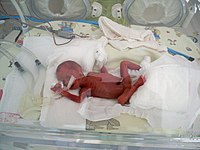
Biomarkers of adiposity are elevated in preterm very-low-birth-weight infants at 1, 2, and 3 y of age
Sign Up to like & getrecommendations! Published in 2017 at "Pediatric Research"
DOI: 10.1038/pr.2017.11
Abstract: Background:Preterm, very-low-birth-weight (PT-VLBW) neonates are at-risk for metabolic syndrome later in life. At 1–3 y, they exhibit excessive weight-for-length z-scores (Wt-LZ) and elevated systolic blood pressures (SBP). Serum adipokines are biomarkers of adiposity, but expression… read more here.
Keywords: age; weight; preterm low; low birth ... See more keywords

Feeding Strategies in Preterm Very Low Birth-Weight Infants
Sign Up to like & getrecommendations! Published in 2021 at "Advances in Neonatal Care"
DOI: 10.1097/anc.0000000000000849
Abstract: Background: Providing enteral feeds to preterm very low birth-weight (VLBW) infants is critical to optimize nutrition, enhance growth, and reduce complications. Protocols guiding feeding practices can improve outcomes, but significant variation exists between institutions, which… read more here.
Keywords: preterm low; birth weight; feeding strategies; low birth ... See more keywords

Preterm and low birthweight birth in the United States: Black midwives speak of causality, prevention, and healing.
Sign Up to like & getrecommendations! Published in 2022 at "Birth"
DOI: 10.1111/birt.12624
Abstract: BACKGROUND Low birthweight (LBW) and preterm birth (PTB) are more common among Black infants than white infants in the United States. Although multiple hypotheses have been proposed to explain elevated rates of PTB and LBW,… read more here.
Keywords: low birthweight; black midwives; prevention; preterm low ... See more keywords

Morbidity and mortality patterns of preterm low birthweight neonates admitted to referral hospitals in the Amhara region of Ethiopia: retrospective follow-up study
Sign Up to like & getrecommendations! Published in 2022 at "BMJ Open"
DOI: 10.1136/bmjopen-2021-054574
Abstract: Objective This study aimed to assess the morbidity and mortality patterns of preterm neonates with low birth weight admitted in the Amhara region referral hospitals in Ethiopia. Design Hospital-based retrospective follow-up study. Setting Amhara region… read more here.
Keywords: low birthweight; preterm low; birthweight neonates; amhara region ... See more keywords

Mother's Own Milk Compared With Formula Milk for Feeding Preterm or Low Birth Weight Infants: Systematic Review and Meta-analysis.
Sign Up to like & getrecommendations! Published in 2022 at "Pediatrics"
DOI: 10.1542/peds.2022-057092d
Abstract: OBJECTIVES We assessed the effect of feeding preterm or low birth weight infants with infant formula compared with mother's own milk on mortality, morbidity, growth, neurodevelopment, and disability. METHODS We searched Medline (Ovid), Embase (Ovid),… read more here.
Keywords: preterm low; low birth; birth weight; milk ... See more keywords

Early Enteral Feeding for Preterm or Low Birth Weight Infants: a Systematic Review and Meta-analysis.
Sign Up to like & getrecommendations! Published in 2022 at "Pediatrics"
DOI: 10.1542/peds.2022-057092e
Abstract: CONTEXT Early enteral feeding has been associated with adverse outcomes such as necrotizing enterocolitis in preterm and low birth weight infants. OBJECTIVES To assess effects of early enteral feeding initiation within the first days after… read more here.
Keywords: preterm low; birth weight; enteral feeding; early enteral ... See more keywords

Fast Feed Advancement for Preterm and Low Birth Weight Infants: A Systematic Review and Meta-analysis.
Sign Up to like & getrecommendations! Published in 2022 at "Pediatrics"
DOI: 10.1542/peds.2022-057092g
Abstract: BACKGROUND AND OBJECTIVES Fast feed advancement may reduce hospital stay and infection but may increase adverse outcomes in preterm and low birth weight infants. The objective of this study was to assess effects of fast… read more here.
Keywords: birth weight; fast feed; preterm low; feed advancement ... See more keywords

Enteral Calcium or Phosphorus Supplementation in Preterm or Low Birth Weight Infants: a Systematic Review and Meta-analysis.
Sign Up to like & getrecommendations! Published in 2022 at "Pediatrics"
DOI: 10.1542/peds.2022-057092m
Abstract: OBJECTIVES To assess effects of calcium or phosphorous supplementation compared with no supplementation in human milk-fed preterm or low birth weight infants. METHODS Data sources include Cochrane Central Register of Controlled Trials, Medline and Embase.… read more here.
Keywords: supplementation; preterm low; low birth; birth weight ... See more keywords

Enteral Multiple Micronutrient Supplementation in Preterm and Low Birth Weight Infants: A Systematic Review and Meta-analysis.
Sign Up to like & getrecommendations! Published in 2022 at "Pediatrics"
DOI: 10.1542/peds.2022-057092n
Abstract: OBJECTIVES To assess effects of supplementation with 3 or more micronutrients (multiple micronutrients; MMN) compared to no MMN in human milk-fed preterm and low birth weight (LBW) infants. RESULTS Data on a subgroup of 414… read more here.
Keywords: supplementation; preterm low; low birth; birth weight ... See more keywords

A suggested screening method for hypothyroidism in very preterm and/or very low birth weight neonates
Sign Up to like & getrecommendations! Published in 2022 at "Revista Paulista de Pediatria"
DOI: 10.1590/1984-0462/2022/40/2020376in
Abstract: ABSTRACT Objective: To assess thyroid function in very preterm or very low birth weight (VLBW) neonates by measuring combination levels of thyroid-stimulating hormone TSH and free T4 (FT4) Methods: Inclusion criteria were defined as all… read more here.
Keywords: preterm low; low birth; birth weight; hypothyroidism ... See more keywords

Two speeds of increasing milk feeds for very preterm or very low-birthweight infants: the SIFT RCT.
Sign Up to like & getrecommendations! Published in 2020 at "Health technology assessment"
DOI: 10.3310/hta24180
Abstract: BACKGROUND Observational data suggest that slowly advancing enteral feeds in preterm infants may reduce necrotising enterocolitis but increase late-onset sepsis. The Speed of Increasing milk Feeds Trial (SIFT) compared two rates of feed advancement. OBJECTIVE… read more here.
Keywords: milk; milk feeds; low birthweight; preterm low ... See more keywords